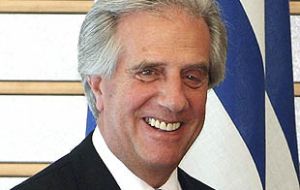MercoPress. South Atlantic News Agency
IMF needs to find ‘adequate balance between economics and politics’
 Former presidents Tabare Vazquez and Ricardo Lagos belong to the regional advisory group
Former presidents Tabare Vazquez and Ricardo Lagos belong to the regional advisory group The International Monetary Fund should find an adequate balance between economics and politics, and take advantage of its cross-country experience to deepen its engagement in the Western Hemisphere and improve the effectiveness of its economic policy advice, a group of high-level advisors recommended Monday.
The recommendation was made to IMF Managing Director Dominique Strauss-Kahn by a Regional Advisory Group meeting in San Jose, Costa Rica, on July 1-2, 2010. The meeting was the first of the newly formed Advisory Group for the Western Hemisphere—an independent panel of high-level experts advising the IMF on its work in the region which includes among others Uruguay and Chile former presidents Tabare Vazquez and Ricardo Lagos.
The group also comprises former presidents Oscar Arias, from Costa Rica; Paul Martin, former prime minister of Canada; Enrique Iglesias, the Ibero-American Secretary General and former president of the Inter-American Development Bank; former ministers Francisco Gil-Diaz, from Mexico, Jose Luis Machinea, from Argentina; Arturo Cruz, former Ambassador of Nicaragua to the U.S.; Carla Hills, former U.S. Trade Representative; Demetrio Magnoli, from the Universidade de Sao Paulo; and Robert Shapiro, head of progressive Policy Institute, from the U.S. Nicolas Eyzaguirre, Western Hemisphere Director at the IMF, is the coordinator of this advisory group.
As part of a broader effort to strengthen its engagement with the membership and to better inform its activities and policy advice in line with country-specific circumstances, the IMF has formed informal regional Advisory Groups for Africa, the Americas, the Asia and Pacific region, Europe, and the Middle East. The groups have an independent, advisory function and bring different perspectives to the Fund’s work in the regions. The advisory groups comprise prominent experts from the private and public sectors, as well as academia and civil society.
“The winning strategy to overcome the global crisis is, first, to accept that the world is indeed globalized, in which there is no place for those who play alone. Big economies and small economies should work together in an integrated way. We expect that this notable group helps us do that and enhance the Fund’s work in the Americas by providing perspectives on key issues for the region and by enhancing our understanding of the concerns of key political actors and policymakers,” Mr. Strauss-Kahn told the Group.
The meeting opened with a discussion on the global economy and the remaining economic uncertainties. Oscar Arias, chair of the first session, said, “Latin-Americans must recover lost time, and taking a leap to development as deserved by our people is on our hands.” The group also focused the discussion on the impact of the global crisis in Latin America and what were the lessons drawn from country responses. “We should analyze the way in which our economies get effectively integrated in the global economy. Latin American countries should be able to speak with one voice and achieving this is a huge challenge for our region. We shouldn’t miss the opportunity the next G-20 offers for us to influence the international agenda,” said Ricardo Lagos, moderator of the second roundtable, in his closing remarks.
In the roundtable moderated by Paul Martin the participants discussed their views on IMF governance, voice and representation of emerging market economies and the Fund’s surveillance work. “It is important for the IMF to find a good balance between its technical recommendations and the political context and processes in each country. Furthermore, the Fund should be able to build more on its cross-country experience to enhance its guidance” Mr. Martin concluded.
The Advisory Group members emphasized the importance of the IMF initiative in seeking different perspectives on key issues and for soliciting feedback aimed at better tailoring its work to the political and economic realities of its member countries.
“The views provided by the members of the Advisory Group in this first meeting have been extremely valuable. If as a result of this crisis all of us understand that we should work together, and we show leadership at global level, then this crisis has produced a positive outcome for the future of the global economy,” Mr. Strauss-Kahn concluded.




Top Comments
Disclaimer & comment rules-

Read all commentsDid anyone here ever read “FOUR STEPS TO DAMNATION” ? I am sure everyone here will enjoy this old article witch by the way still valid today because nothing has changed one bit since it was writen.
Jul 07th, 2010 - 05:29 pm 0http://www.guardian.co.uk/business/2001/apr/29/business.mbas
Commenting for this story is now closed.
If you have a Facebook account, become a fan and comment on our Facebook Page!